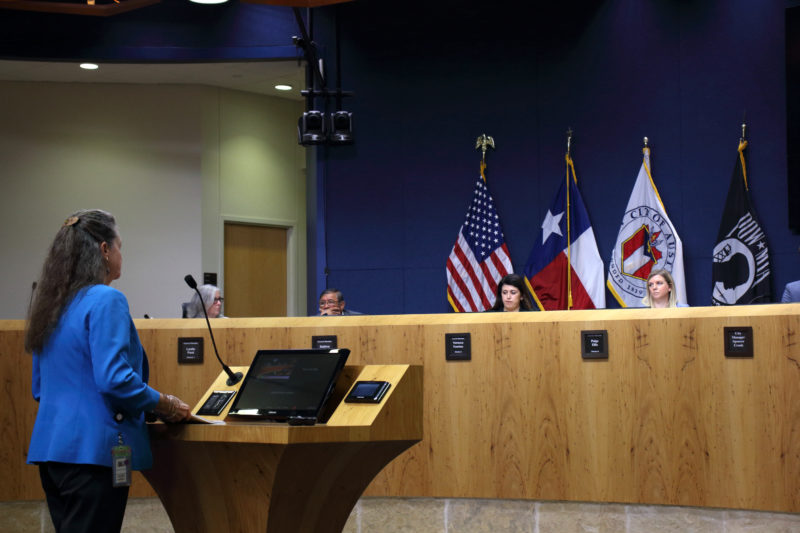Austin City Council Approves $15 Monthly Electricity Bill Increase Starting Nov. 1
By Keaton Peters
Reporting Texas

Austin Energy General Manager Jackie Sargent speaks to the Austin City Council about a $15 monthly increase for residential electricity bills on Oct. 13, 2022. Keaton Peters/Reporting Texas
The Austin City Council voted 7-4 Thursday to increase the average monthly residential electricity bill by about $15 starting Nov. 1.
In voting for the increase, Council Member Allison Alter said the increases are “primarily driven by external market factors beyond our control.”
The increase is one of two rate increases proposed by Austin Energy, the city’s nonprofit publicly-owned electric utility company. The $15 increase will cover rising costs from the record-high price of natural gas, increasing energy demand and regulatory changes coming from ERCOT, Texas’ grid operator, according to Austin Energy.
Austin Energy sets rates for power supply adjustments every fiscal year to take effect on Nov. 1 based on its projections for energy costs for the following year.
“We didn’t anticipate the hot summer or the war in Ukraine with the high price of natural gas,” said Council Member Sabino Renteria, who also voted for the rate increase.
Austin Energy spokesperson Matt Mitchell explained that a “confluence of circumstances” has resulted in the utility needing to recover $104 million it already spent in fiscal 2022.
At the same time that Texas faced a heat wave and “demand across the state drove up costs,” the cost of natural gas, which accounts for 60% of the energy on the ERCOT market, rose 108% from the previous year to the highest level since 2008, according to Mitchell.
The council added an amendment to the rate increase that gives Austin Energy authority to adjust the power supply rate by up to 5% per month to account for fluctuations in the cost of energy.
Mitchell said the rate for fiscal 2022 was set lower than normal due to Winter Storm Uri. During the February 2021 storm, Austin Energy made significant profits because Austin Energy’s “power production did not go offline,” allowing the utility to sell energy to the ERCOT market at a profit.
Austin Energy decided in November 2021 to return those profits to Austin residents by lowering the rate for the following year, so now Austin residents may experience “sticker shock,” as several council members described it.
Originally, Austin Energy proposed a slightly steeper increase to recover the $104 million over one year. Instead, the council decided to lessen the blow on residents, and Austin Energy will recover the loss over three years, and ratepayers will save about $5 per month versus the one-year plan.
“We all put our heads together and worked together to get to a good compromise,” said Council Member Leslie Pool, as she thanked Austin Energy staff before voting for the proposal.
In addition to recovering the $104 million power supply adjustment, a smaller portion of the rate increase is a result of power congestion fees ERCOT charges when energy transmission lines get overcrowded.
Ed Hirs, an energy expert with the University of Houston, told Reporting Texas that ERCOT began charging the fees to “encourage construction of new transmission lines.” Currently, there is an excess of power generation in places like West Texas and not enough lines to bring that energy to markets such as Austin.
Hirs said that energy customers all across Texas will get hit with these costs in the form of ERCOT fees or by energy producers passing along the cost of constructing new transmission lines to consumers.
Council Member Vanessa Fuentes, who represents Southeast Austin, voted against the rate increase, saying, “Austinites deserve a better option.”
“I constantly hear stories from our community members about displacement, rising rents and stagnant paychecks. The last thing we should do is add to their burden,” Fuentes said.
In attempts to address affordability concerns, Austin Energy spends about $23 million to assist customers who are unable to pay their bills.
“We have one of the most robust customer assistance programs in the country,” Mitchell said. “We work with anyone and everyone who comes through that door and says ‘I’m having trouble paying these bills.’”
In addition to affordability, Texas Sierra Club conservation director Cyrus Reed said he was concerned that proposed changes to Austin Energy’s base rate that the council will consider later this year will discourage conservation.
“It’s going in the wrong direction,” Reed said.